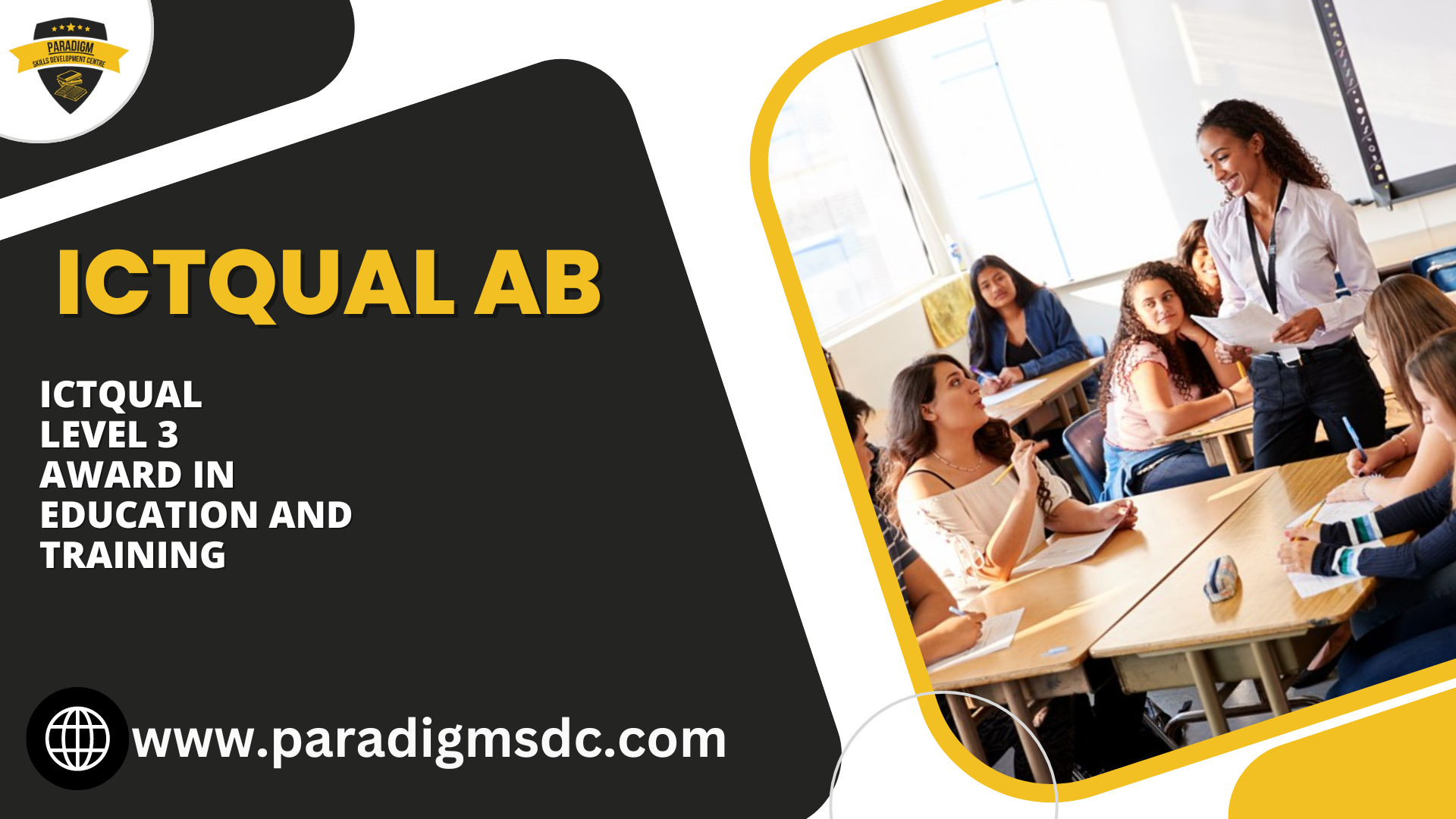Course Introduction
The ICTQual Level 3 Award in Education and Training is an introductory teaching qualification designed for those who wish to begin a career in teaching or training. This course provides a foundational understanding of the key principles and practices of effective teaching, equipping learners with the essential skills needed to deliver engaging and inclusive educational sessions. Whether you are new to the field or looking to formalize your existing teaching experience, this qualification serves as the perfect starting point for a rewarding career in education and training.
Course Overview
The ICTQual Level 3 Award in Education and Training covers a broad spectrum of topics essential for aspiring educators. Participants will learn about the roles and responsibilities of a teacher, understand how to create a conducive learning environment, and develop practical teaching skills. The course also emphasizes the importance of planning, delivering, and evaluating teaching sessions to meet the diverse needs of learners.
Course Study Units
- Understanding Roles, Responsibilities, and Relationships in Education and Training
- Planning to Meet the Needs of Learners in Education and Training
- Delivering Education and Training
- Assessing Learners in Education and Training
- Using Resources for Education and Training
- Understanding and Using Inclusive Teaching and Learning Approaches
- Facilitating Learning and Development for Individuals
- Principles of Assessment in Education and Training
Learning Outcomes
By the end of this course, participants will be able to:
Understanding Roles, Responsibilities, and Relationships in Education and Training:
- Understanding Roles and Responsibilities:
- Define the roles and responsibilities of teachers/trainers in education and training contexts.
- Identify the legal and ethical frameworks that govern the practice of teaching.
- Demonstrate an understanding of professional boundaries and codes of conduct.
- Establishing Positive Relationships:
- Develop strategies for building positive relationships with learners and colleagues.
- Recognize the importance of effective communication in establishing rapport and trust.
- Demonstrate empathy and respect for diverse learner needs and backgrounds.
- Maintaining Professionalism:
- Adhere to professional standards of behavior and practice.
- Manage boundaries and maintain confidentiality in professional relationships.
- Reflect on personal practice and seek opportunities for professional development.
Planning to Meet the Needs of Learners in Education and Training:
- Identifying Learning Objectives:
- Set clear and achievable learning objectives aligned with curriculum requirements.
- Consider the diverse needs, abilities, and prior knowledge of learners when planning lessons.
- Selecting Teaching and Learning Methods:
- Choose appropriate teaching and learning methods to engage learners and facilitate learning.
- Incorporate a variety of instructional strategies to cater to different learning styles and preferences.
- Differentiating Instruction:
- Adapt teaching approaches and resources to meet the individual needs of learners.
- Provide support and challenge appropriately to promote inclusive learning environments.
Delivering Education and Training:
- Engaging Learners:
- Deliver engaging and interactive teaching sessions that capture learners’ interest and enthusiasm.
- Encourage active participation and collaboration among learners.
- Effective Communication:
- Communicate clearly and effectively to convey key concepts and instructions.
- Use verbal and non-verbal communication techniques to enhance understanding and engagement.
- Managing Classroom Dynamics:
- Maintain a positive and inclusive learning environment conducive to learning.
- Address disruptions or conflicts effectively while respecting the dignity and rights of all learners.
Assessing Learners in Education and Training:
- Designing Assessment Strategies:
- Develop assessment plans that align with learning objectives and curriculum requirements.
- Select appropriate assessment methods to measure learner progress and achievement.
- Providing Constructive Feedback:
- Provide timely and constructive feedback to support learner development and improvement.
- Identify strengths and areas for improvement based on assessment outcomes.
- Ensuring Fairness and Reliability:
- Implement assessment practices that are fair, valid, reliable, and consistent.
- Maintain confidentiality and integrity in the assessment process.
Using Resources for Education and Training:
- Selecting Appropriate Resources:
- Identify and select suitable teaching and learning resources to support instructional goals.
- Evaluate the relevance, quality, and accessibility of resources for diverse learners.
- Utilizing Digital Technologies:
- Incorporate digital technologies and multimedia resources effectively to enhance teaching and learning experiences.
- Foster digital literacy skills among learners through the use of technology-rich learning environments.
- Evaluating Resource Effectiveness:
- Reflect on the effectiveness of resources used and make adjustments as necessary to improve learning outcomes.
- Seek feedback from learners and colleagues to inform resource selection and implementation.
Course Benefits
- Foundational Knowledge: Gain essential knowledge and skills for a career in teaching and training.
- Professional Recognition: Obtain a recognized qualification that validates your capabilities as an educator.
- Practical Skills: Develop practical teaching and assessment skills applicable in various educational settings.
- Career Entry: Provide a stepping stone into the education and training sector.
- Inclusive Teaching: Learn to create inclusive learning environments that support diverse learners.
- Continuous Improvement: Engage in reflective practice to enhance your teaching effectiveness.
Who is this Course For?
This course is ideal for:
- Aspiring teachers and trainers seeking an entry-level qualification in education.
- Professionals looking to transition into a teaching or training role.
- Current educators who want to formalize their experience with a recognized qualification.
- Workplace trainers and HR professionals responsible for staff development.
- Individuals involved in community education, voluntary training, or adult education programs.
Future Progression
Upon completing the ICTQual Level 3 Award in Education and Training, participants can further their career development by:
- Pursuing higher-level qualifications, such as the ICTQual Level 4 Certificate in Education and Training or the ICTQual Level 5 Diploma in Education and Training.
- Specializing in specific areas of education, such as special needs education, vocational training, or e-learning.
- Gaining practical experience and seeking roles in teaching, training, and educational support.
- Engaging in continuous professional development through workshops, seminars, and additional certifications.
- Exploring opportunities in educational administration, curriculum development, or instructional design.
The ICTQual Level 3 Award in Education and Training provides a robust foundation for anyone looking to embark on a career in education and training. By mastering the skills and knowledge covered in this course, participants will be well-prepared to deliver effective, inclusive, and engaging educational experiences.







